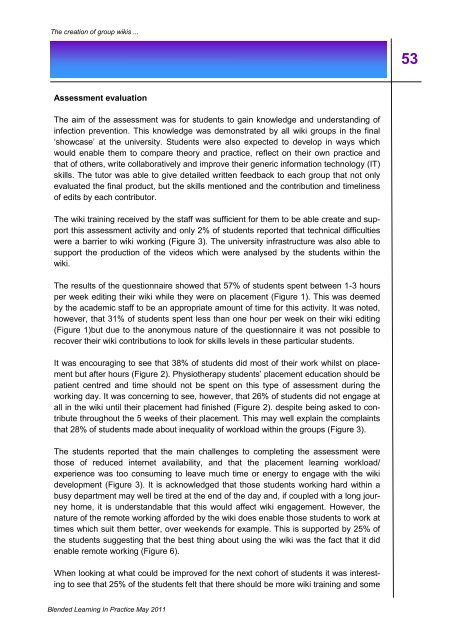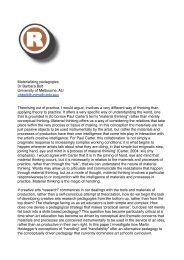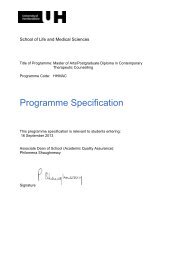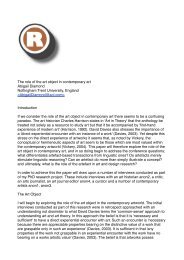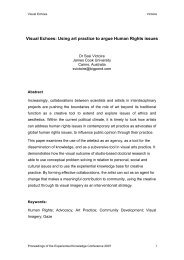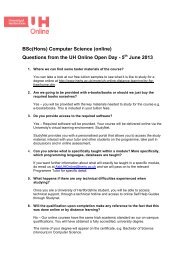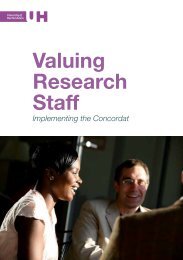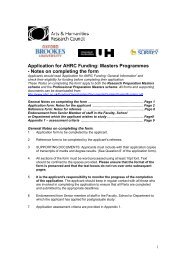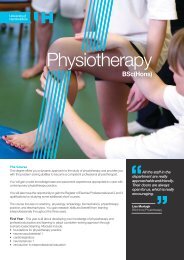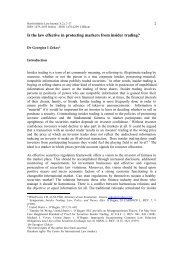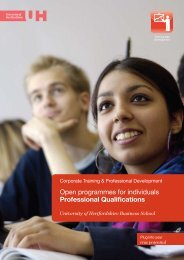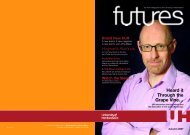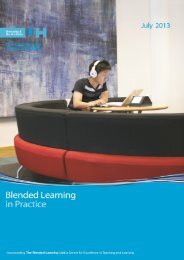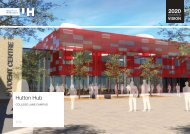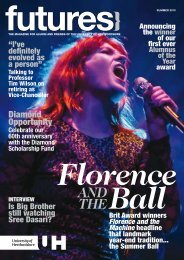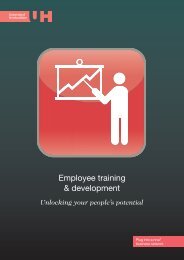3 - University of Hertfordshire
3 - University of Hertfordshire
3 - University of Hertfordshire
Create successful ePaper yourself
Turn your PDF publications into a flip-book with our unique Google optimized e-Paper software.
The creation <strong>of</strong> group wikis ...53Assessment evaluationThe aim <strong>of</strong> the assessment was for students to gain knowledge and understanding <strong>of</strong>infection prevention. This knowledge was demonstrated by all wiki groups in the final„showcase‟ at the university. Students were also expected to develop in ways whichwould enable them to compare theory and practice, reflect on their own practice andthat <strong>of</strong> others, write collaboratively and improve their generic information technology (IT)skills. The tutor was able to give detailed written feedback to each group that not onlyevaluated the final product, but the skills mentioned and the contribution and timeliness<strong>of</strong> edits by each contributor.The wiki training received by the staff was sufficient for them to be able create and supportthis assessment activity and only 2% <strong>of</strong> students reported that technical difficultieswere a barrier to wiki working (Figure 3). The university infrastructure was also able tosupport the production <strong>of</strong> the videos which were analysed by the students within thewiki.The results <strong>of</strong> the questionnaire showed that 57% <strong>of</strong> students spent between 1-3 hoursper week editing their wiki while they were on placement (Figure 1). This was deemedby the academic staff to be an appropriate amount <strong>of</strong> time for this activity. It was noted,however, that 31% <strong>of</strong> students spent less than one hour per week on their wiki editing(Figure 1)but due to the anonymous nature <strong>of</strong> the questionnaire it was not possible torecover their wiki contributions to look for skills levels in these particular students.It was encouraging to see that 38% <strong>of</strong> students did most <strong>of</strong> their work whilst on placementbut after hours (Figure 2). Physiotherapy students‟ placement education should bepatient centred and time should not be spent on this type <strong>of</strong> assessment during theworking day. It was concerning to see, however, that 26% <strong>of</strong> students did not engage atall in the wiki until their placement had finished (Figure 2). despite being asked to contributethroughout the 5 weeks <strong>of</strong> their placement. This may well explain the complaintsthat 28% <strong>of</strong> students made about inequality <strong>of</strong> workload within the groups (Figure 3).The students reported that the main challenges to completing the assessment werethose <strong>of</strong> reduced internet availability, and that the placement learning workload/experience was too consuming to leave much time or energy to engage with the wikidevelopment (Figure 3). It is acknowledged that those students working hard within abusy department may well be tired at the end <strong>of</strong> the day and, if coupled with a long journeyhome, it is understandable that this would affect wiki engagement. However, thenature <strong>of</strong> the remote working afforded by the wiki does enable those students to work attimes which suit them better, over weekends for example. This is supported by 25% <strong>of</strong>the students suggesting that the best thing about using the wiki was the fact that it didenable remote working (Figure 6).When looking at what could be improved for the next cohort <strong>of</strong> students it was interestingto see that 25% <strong>of</strong> the students felt that there should be more wiki training and someBlended Learning In Practice May 2011


